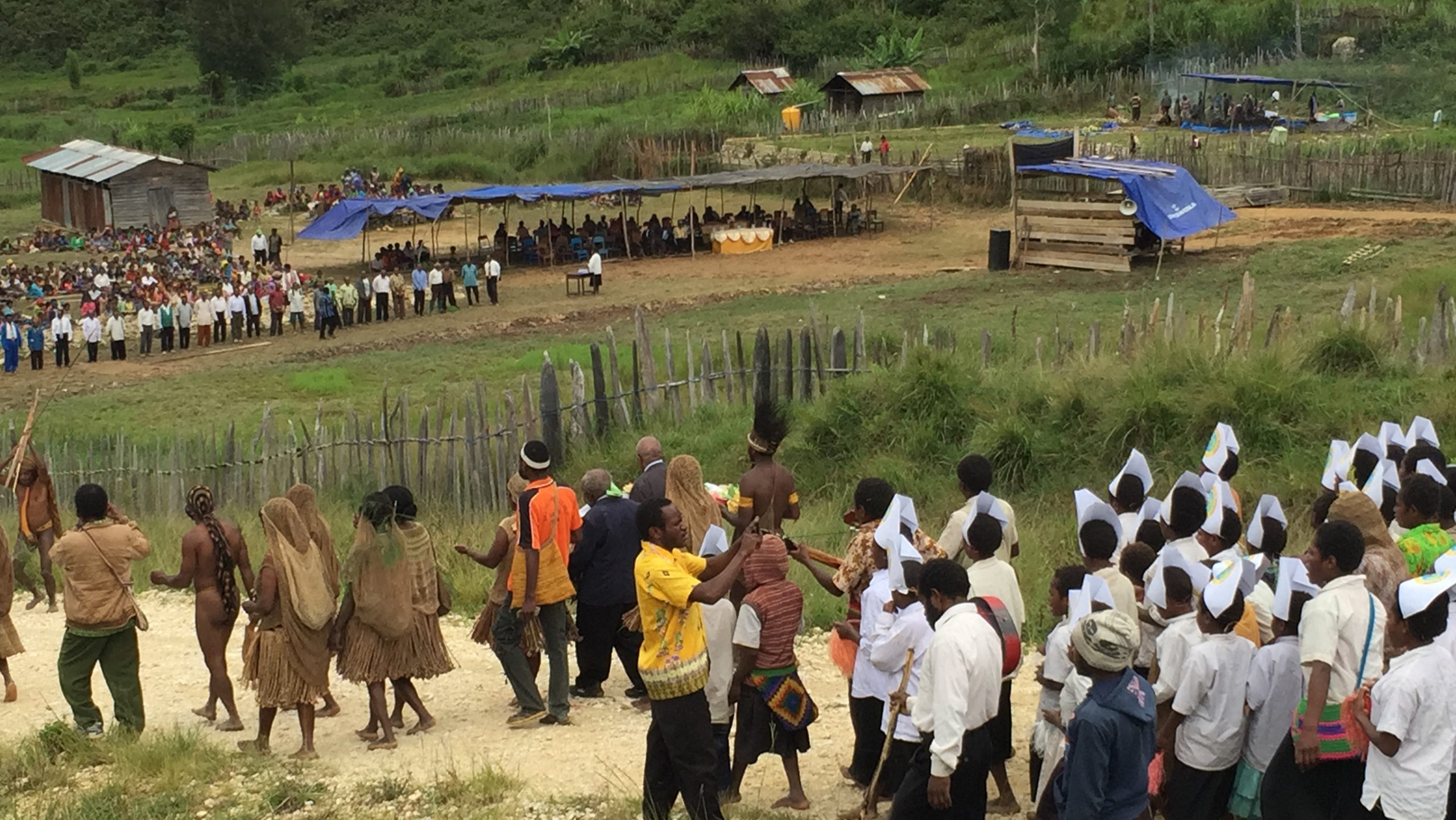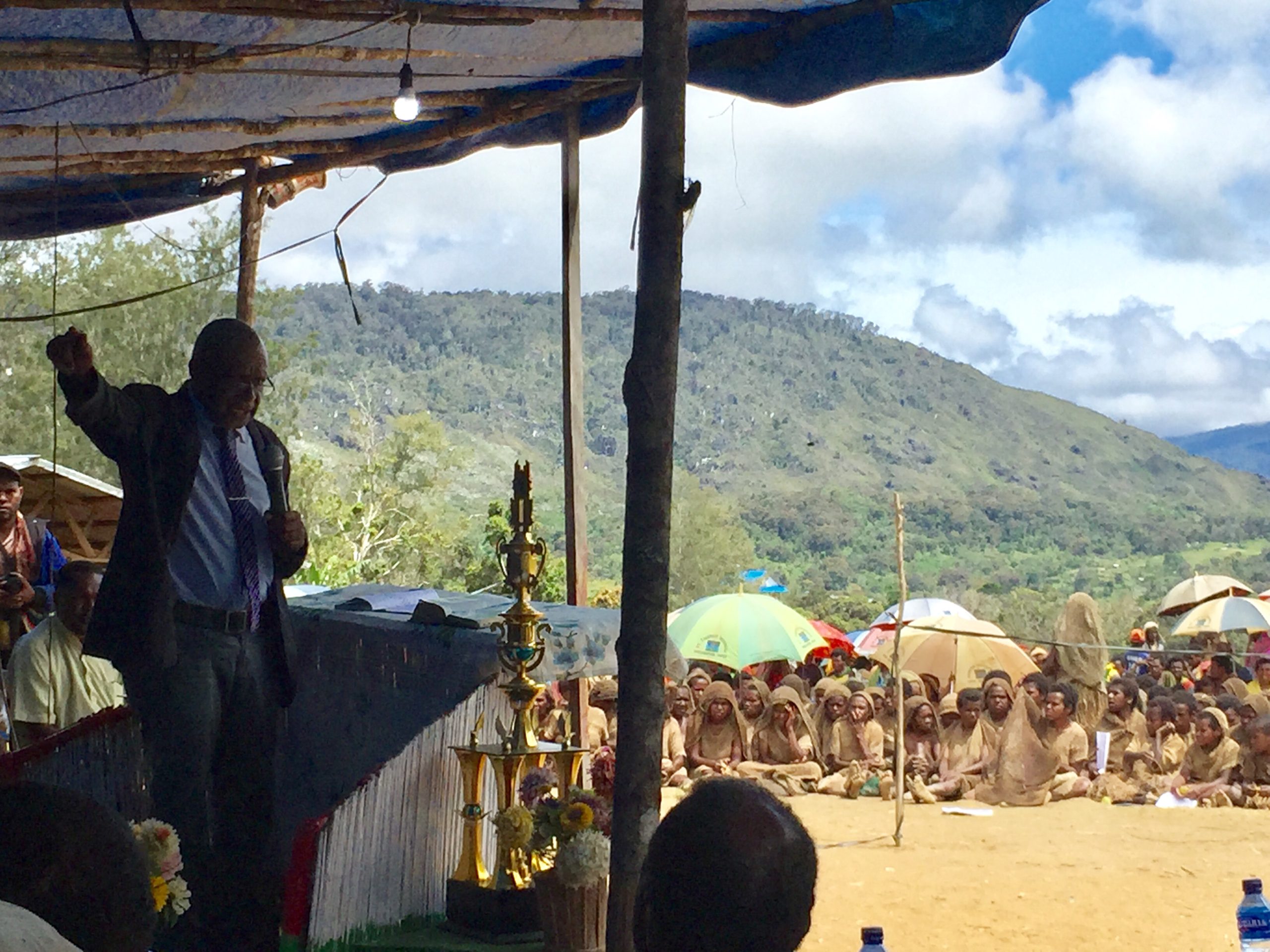
Interview
Working Politically with Knowledge
Cypri Jehan Paju Dale
Area: Indonesia, West Papua, Southeast Asia
Download PDFCypri Jehan Paju Dale is social anthropologist with research and professional interests in the politics of development, endogenous transformation, and interspecies companionship. He completed his PhD at the Institute of Social Anthropology at Bern University in Switzerland in 2018. He is currently a Postdoctoral fellow at Center for Southeast Asian Studies (CSEAS), Kyoto University.
{ Q1 }
Please tell us about your research. 
I am a social anthropologist with research interests in the politics of development, endogenous transformation, and multispecies relations, with a geographical focus in West Papua and Flores (Indonesia). At this moment I am working on a book manuscript based on my dissertation project, entitled “Development as Self-Determination: Endogenous Transformation, Anti-colonial Struggles, and the Role of Christianity in West Papua.” Based on an ethnography of indigenous and Christian communities in West Papua, I aim to theorize a form of social transformation that relies on the active agency of people who are targeted by external development interventions in adopting, adapting, and resisting external improvement schemes in order to empower themselves and venture on anti-colonial resistance and self-determination.
In addition to this book project, I am also embarking on a new research project that examines the social, cultural, and ecological transformations induced by the large-scale tourism development and conservation projects on the Islands of Flores, Indonesia. At the core of this research is an investigation of the entanglement of conservation, eco-tourism, and interspecies companionship in Komodo National Park, a 1,773 km2 terrestrial and marine protected zone that is the home of the Komodo dragons (Varanus komodoensis) and their companions, including humans.1
{ Q2 }
Why did you choose to be a scholar and
how did you decide on your current research topic and approach? 
Prior to my PhD study, I worked in the civil society sector with communities and activist networks navigating the negative impacts of large-scale development projects and initiating alternatives for environmentally and socially appropriate approaches. This involved advocacy-oriented research activities. We worked politically with knowledge. When I got an opportunity to pursue a PhD study, I took it as a signal to engage in critical knowledge production that matters for society and hence have a larger impact. My research endeavors in West Papua and in Flores, my hometown, is in a way a continuation of this trajectory of work.
I see the role of being a researcher, a scholar, as not in opposition to being a practitioner. Scholars always have opportunities to engage in real world problems, through analysis and critical thinking, and through collaborations with communities and other stakeholders in concrete work beyond academia. So, I chose to be a scholar because it provides more opportunity to engage in the production of critical knowledge, which in turn hopefully contributes to change in the social reality.

Cypri Jehan Paju Dale
(CSEAS Program-Specific Researcher)
Area:
Indonesia, West Papua, Southeast Asia
Research Interests / Keywords:
- • Politics of development
- • endogenous transformation
- • interspecies companionship
- • anthropology of christianity
{ Q3 }
Please tell us episodes about the impressive people,
things, and places you have encountered in your research. 
In both of my research sites, I encounter and work with fascinating people. Indigenous communities in the highlands of West Papua who started to encounter Christianity in the mid-twentieth century (a bit later compared to other parts of the world) have adopted Christianity, but at the same time have revitalized their pre-existing or indigenous culture, religion, or spirituality. Combining the two elements, they mobilize a self-fashioned transformation under the framework of “Berubah Supaya Lebih Kuat,” meaning “to transform oneself to become stronger.” While accepting Christianity, they have also been critical of the entanglements of the missionaries and church leaders with the colonial and capitalist operations in their land. So they took over the church, delinking their ties to the Euro-American and Indonesian churches, and develop a form of indigenous churches under their control. They have also developed a political theology that lays the foundation for anti-colonial resistance and the struggle for self-determination. In terms of research, these fascinating communities challenge orthodox theories on conversion, resistance, and social transformation in Anthropology.
In Flores, I also work with the Ata Modo, the indigenous community of Komodo Island, which is the habitat of the largest living lizard, known as the Komodo dragon. In contrast to modern science, which renders the Komodo dragon as wildlife, the people of Komodo frame their relationships with the dragons using kinship terms. The Komodo is believed to be a twin brother or sister, born from the same human mother, and this belief has inspired everyday practices of sharing space and conviviality among humans and non-humans. In opposing the current conservation and tourism development projects by the state and corporate actors, the Ata Modo re-articulate their kinship relationships with the dragon. This articulation provides the basis for different thinking and actions for conservation, tourism, and human-animal-environment co-existence.
The engagement with these two fascinating communities provides plenty of food of thought for my research.
Photos

Christian communities in Paniai, West Papua (2016)

Benny Giay and His Community, the Kingmi Church of West Papua (2016)

In the village of Komodo (2020)
{ Q4 }
Please tell us about the books and
experiences that have particularly influenced you. 
In doing my research, I am particularly inspired by the book of Linda Tuhiwai Smith, Decolonizing Methodology: Research and Indigenous Peoples (2021, 1999), the book of Stuart Kirsch, Engaged Anthropology: Politics Beyond the Text (2018), and the book of Benny Giay, Zakheus Pakage and His Communities (1995, 2022). For many indigenous and marginalized communities in the Global South, being researched has become part and parcel of being subjugated, being colonized. Researchers coming from such communities, or those who are in solidarity and build alliance with them, should decolonize research practices and methods in order to produce knowledge that empowers instead of subjugates. We also need to set up our own research agenda and produce knowledge that matters for our society. In Engaged Anthropology, Stuart Kirsch explores how engagement with the real-world problems is not only possible, but also necessary for a researcher to produce knowledge that matters for our society. His account of his own engagement with indigenous communities, environmentalists, and lawyers in their battles against extractive corporations and governments provides inspiration and strategies for engaged research. Last but not the least, Benny Giay’s book, Zakheus Pakage and His Communities, provides an inspiring example of auto-ethnography through which a scholar can research and write about his or her own community and produce a critical and transformative knowledge.
{ Q5 }
Could you tell us about your ideal image of a researcher? 
I think an ideal researcher is one who produces scholarship that matters. It comes from robust publications and active engagements, especially with the communities she/he is working with, and hence has a strong impact on discursive practice.
{ Q6 }
Please tell us about the difficulties you faced in compiling the results of your research into a paper or book. 
I am struggling a lot with writing. More specifically, how to tell my story in a compelling and effective way. Secondly, how to build theory, a grounded theory from field data. I think part of the problem is that I have not really shaped my academic and creative writing skills since the early phase of my scholarship.
{ Q7 }
Which books do you recommend
for young scholars and why? 
In terms of the politics of research and research methodologies, I recommend Engaged Anthropology by Stuart Kirsch and Decolonizing Methodology by Linda Tuhiwai Smith. For anthropologists, these books help us position our scholarship in a larger social context, and also to shape our research practices or strategies in a more impactful way.
{ Q8 }
Please give us your short remark for
some young people who wish to be a scholar. 
In the early years of my study, I was thinking that the most important thing for me was to learn and learn. In the later stage, I realize that apart from continuous learning, being a scholar is also about producing scholarship that matters. In this regard, I feel like I should have developed my writing skills since the early stage. So, my piece of advice for young people in the early stage of their study, if I may, is to start shaping up their academic and creative writing skills early on. It will help them a lot in the later phase of their journey.
{ Q9 }
Please tell us your future ambitions. 
I hope that by the end of my Postdoc term here at CSEAS, I am able to publish some substantial parts of my research. For the future, I hope to be able to produce scholarship that has a place in the academia, or in my discipline, but also a kind of scholarship that matters for the society, especially the communities that I am working with in my research.
(March 16, 2022)
Note
1. Cypri Jehan Paju Dale and Gregorius Afioma, “Puzzling Confluence of Conservation and Ecotourism in Komodo National Park, Indonesia,” Japan-ASEAN Transdisciplinary Studies Working Paper Series 10 (2020). https://doi.org/10.14989/TDWPS_10



